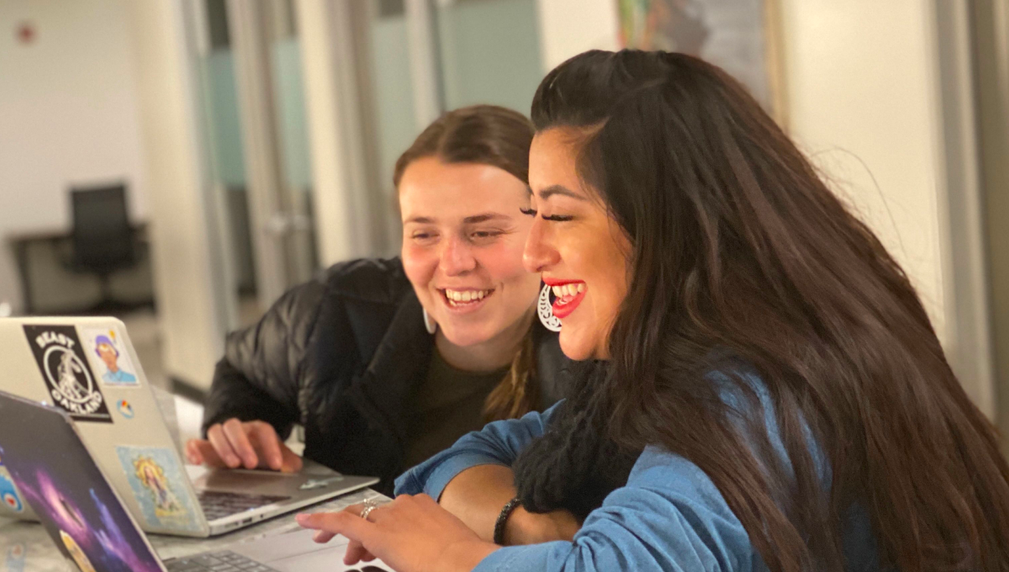Reimagining college for economic mobility
Rivet School is a reimagined college experience for traditionally underserved students, including Black and Latino students, and those who are the first in their family to enroll in college. We partner with flexible, career-aligned BA degree programs, and provide a hands-on, cohort-based experience with personalized coaching. Our students get the attention and support they need to attain a bachelor’s degree in as little as 2-3 years.

What is the primary issue area that your application will impact?
Youth Economic Advancement (sponsored by Funding Partner, TBA)
In which areas of Los Angeles will you be directly working?
County of Los Angeles
In what stage of innovation is this project, program, or initiative?
Expand existing project, program, or initiative
What is your understanding of the issue that you are seeking to address?
Rivet School exists because our students, most of whom are Black, Latino, and the first in their families to attend college, have been blocked from economic mobility by inequitable and racist institutions. These students are less than half as likely to persist from high school to a college degree as their peers. We know that a college degree remains one of the surest paths to social and economic advancement; the median lifetime earnings for individuals with bachelor's degrees are twice that of those with only high school diplomas. And between 2016 and 2026, it’s projected that the number of jobs requiring a bachelor’s degree will increase by 10%. Simply put: current pathways to higher education are not equipped to address these disparities. In Los Angeles, nearly 50% of Black and Latino high school graduates end up enrolling in the local community college system (LACCD), yet only six percent of Black students and seven percent of Latino students earn an AA degree within three years.
Describe the project, program, or initiative this grant will support to address the issue.
At Rivet School, we pair a career-oriented online degree with high-touch, personalized coaching and real-world resources to support BA attainment. We launched our core program for working adults 25 years and older, and are on track to serve more than 300 students by the end of 2022. This grant will allow us to expand our reach and enrollment in Los Angeles by serving a younger student profile through our newly designed Bridge program. Our learner-centered college model is designed to combat the status quo college outcomes for this population of students by decreasing the time to a degree, increasing on-time graduation, and decreasing (or, in some cases, eliminating) post-graduate debt, thereby unlocking economic advancement. The Bridge program adds two new components to our core program design to meet the needs of 18-24 year olds. First, students enter the program with a cohort of peers, creating a community of support and accountability. Second, we’ve developed a highly-structured curriculum to serve as a scaffold to support the transition from high school to college learning. Bridge cohorts meet twice per week for two-hour sessions as students prepare to become self-directed learners. By partnering with high schools in the region, including some of our current partners, like Da Vinci Schools and Green Dot Public Schools, we hope to effectively enroll students who will benefit from this type of personalized learning experience.
Describe how Los Angeles County will be different if your work is successful.
Between 2019 and 2020, Black student enrollment in L.A. community colleges fell 40%, while Latino student enrollment fell by 32%. The pandemic amplified trends that were already disadvantaging low-income students of color. Once enrolled at LACCD, only 8% percent of Black students and 10% of Latino students go on to earn an AA degree within four years of enrollment. The 4-year graduation rate at CSU Los Angeles is only 14% for Black students and 19% for Latino students. Youth in our state’s foster system enroll in college at even lower rates than their peers, and need an even more supported and flexible onramp to college. We aim to upend these trends and serve as a proof point of what’s possible for our most under-resourced youth. Our model is designed to decrease time to earning a degree and increase persistence. For each of these measures, we have early results that outperform the traditional college system by 2x- 5x, depending on the metric being compared.
What evidence do you have that this project, program, or initiative is or will be successful, and how will you define and measure success?
Rivet School is a results-oriented organization. We collect data rigorously and approximate comparisons to the traditional higher education system to measure our outcomes against the alternative. Our program metrics include number of students enrolled, time to graduation, pace to degree, lifetime persistence, and annual retention rates. We have over 150 students enrolled, with over 30 living in L.A.. Our time to graduation for our 36 BA graduates is 2.2 years. Our pace to degree for actively enrolled students is 4.5 years. Our persistence is 75%, and our 1-year retention rate is 86%. These results are proving out our theory of change, as students outperform their peers enrolled in other institutions of higher education. In L.A., we hope to enroll 50 new students, ages 18 - 24 years old, by September 2023. Of those enrolled, 80% will identify as Black or Latino. We will support this group to graduate within 3.5 years, and will achieve a persistence rate of 70% or higher.
Approximately how many people will be impacted by this project, program, or initiative?
Direct Impact: 50
Indirect Impact: 0
Describe the specific role of the partner organization(s) in the project, program, or initiative.
While we are not submitting this application as a collaborative proposal, we do intend to partner closely with anchor high school partners to achieve our goals during the grant period, and for years to come.